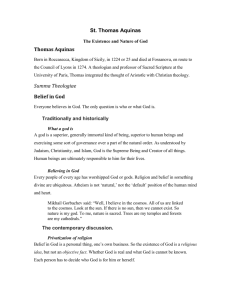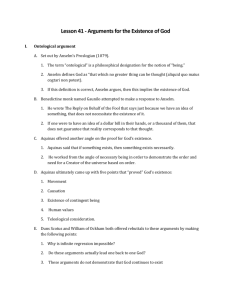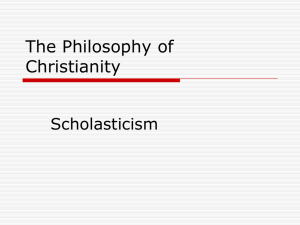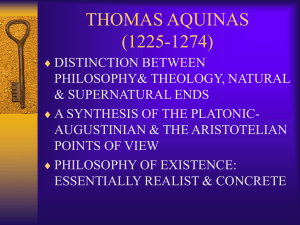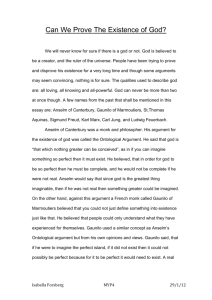Aquinas vs. Buridan on Essence and Existence
advertisement
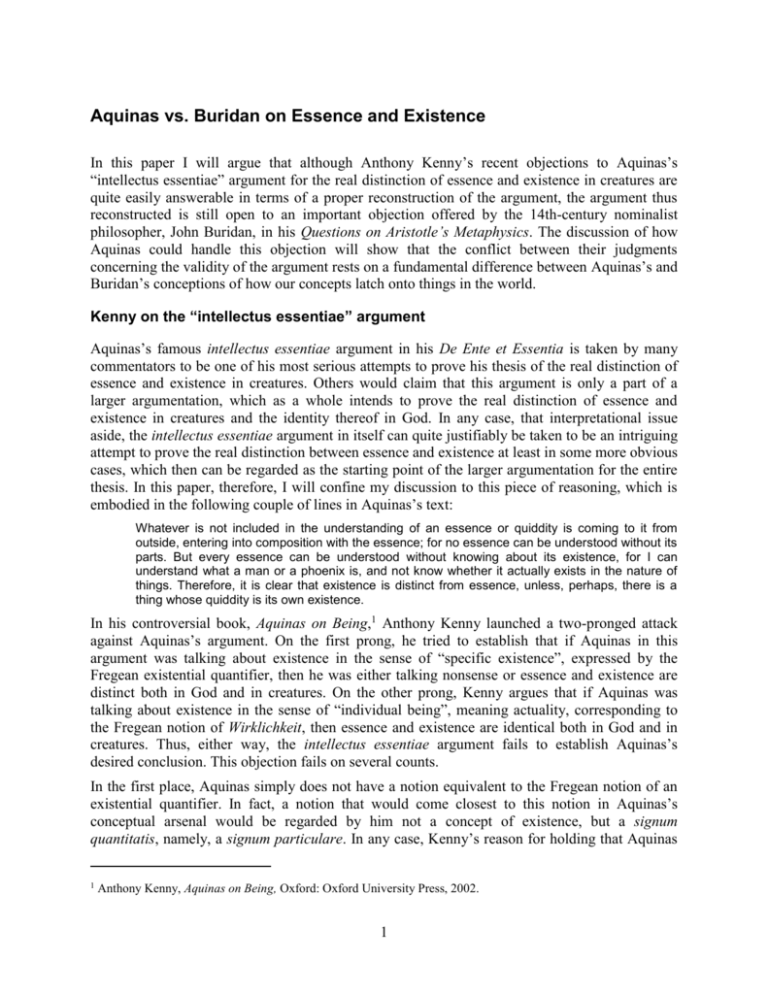
Aquinas vs. Buridan on Essence and Existence In this paper I will argue that although Anthony Kenny’s recent objections to Aquinas’s “intellectus essentiae” argument for the real distinction of essence and existence in creatures are quite easily answerable in terms of a proper reconstruction of the argument, the argument thus reconstructed is still open to an important objection offered by the 14th-century nominalist philosopher, John Buridan, in his Questions on Aristotle’s Metaphysics. The discussion of how Aquinas could handle this objection will show that the conflict between their judgments concerning the validity of the argument rests on a fundamental difference between Aquinas’s and Buridan’s conceptions of how our concepts latch onto things in the world. Kenny on the “intellectus essentiae” argument Aquinas’s famous intellectus essentiae argument in his De Ente et Essentia is taken by many commentators to be one of his most serious attempts to prove his thesis of the real distinction of essence and existence in creatures. Others would claim that this argument is only a part of a larger argumentation, which as a whole intends to prove the real distinction of essence and existence in creatures and the identity thereof in God. In any case, that interpretational issue aside, the intellectus essentiae argument in itself can quite justifiably be taken to be an intriguing attempt to prove the real distinction between essence and existence at least in some more obvious cases, which then can be regarded as the starting point of the larger argumentation for the entire thesis. In this paper, therefore, I will confine my discussion to this piece of reasoning, which is embodied in the following couple of lines in Aquinas’s text: Whatever is not included in the understanding of an essence or quiddity is coming to it from outside, entering into composition with the essence; for no essence can be understood without its parts. But every essence can be understood without knowing about its existence, for I can understand what a man or a phoenix is, and not know whether it actually exists in the nature of things. Therefore, it is clear that existence is distinct from essence, unless, perhaps, there is a thing whose quiddity is its own existence. In his controversial book, Aquinas on Being,1 Anthony Kenny launched a two-pronged attack against Aquinas’s argument. On the first prong, he tried to establish that if Aquinas in this argument was talking about existence in the sense of “specific existence”, expressed by the Fregean existential quantifier, then he was either talking nonsense or essence and existence are distinct both in God and in creatures. On the other prong, Kenny argues that if Aquinas was talking about existence in the sense of “individual being”, meaning actuality, corresponding to the Fregean notion of Wirklichkeit, then essence and existence are identical both in God and in creatures. Thus, either way, the intellectus essentiae argument fails to establish Aquinas’s desired conclusion. This objection fails on several counts. In the first place, Aquinas simply does not have a notion equivalent to the Fregean notion of an existential quantifier. In fact, a notion that would come closest to this notion in Aquinas’s conceptual arsenal would be regarded by him not a concept of existence, but a signum quantitatis, namely, a signum particulare. In any case, Kenny’s reason for holding that Aquinas 1 Anthony Kenny, Aquinas on Being, Oxford: Oxford University Press, 2002. 1 would have to use in his argument the notion of specific existence, and, correspondingly, the notion of nominal as opposed to real essence, is his unjustified assumption that Aquinas would take a phoenix by definition to be a fictitious bird as we do. However, from his argument, as well as from the parallel text of his Commentary on the Sentences,2 it is quite clear that Aquinas uses this example as the illustration of a real, but ephemeral natural phenomenon, like a lunar eclipse or a rainbow, the essence of which we could know perfectly well in terms of a scientific definition, yet, we may not know whether this kind of thing actually exists at the present time. So, Kenny’s objection definitely fails on the first prong, on account of simply missing Aquinas’s point in the argument. But Kenny’s objection fails on its second prong as well, even if the interpretation it involves is somewhat closer to Aquinas’s original intention (although it entirely disregards Aquinas’s conception of the analogy of being). For Kenny bases his objection on the false assumption that the distinctness of essence and existence would have to mean that it is possible to have one without the other. (And so, he argues, since it is impossible to have a dog’s existence without its essence, for a dog cannot be without being a dog, essence and existence would have to be the same also in the case of this creature). However, this assumption is obviously false: for it is clearly possible to have distinct, yet necessarily co-occurring items in reality. For example, it is clear that the triangularity of any particular triangle (its having three angles) is not the same as its trilaterality (its having three sides), unless sides and angles are the same items. But it is also clear that one cannot have a particular triangularity without a particular trilaterality. So, we have two really distinct items here, clearly distinguishable in Aquinas’s fine-grained semantics (even if not distinguishable in more coarse-grained modern conceptions), which are nevertheless inseparable in reality. Therefore, pace Kenny, real distinction does not have to mean real separability, which finishes off the other prong of his attack. Reconstructing the argument Accordingly, to avoid the misunderstandings involved in Kenny’s criticism, we have to understand the argument as dealing with real, individualized essences, and arguing for their real, mind-independent distinction from real, individual acts of existence at least in those cases in which we have knowledge of the essence, yet, we may not know whether it is actually present in any actually existing individual. Therefore, taking c to be any arbitrarily chosen thing whose nature is known but whose existence is not known, the gist of the argument may be reconstructed as follows: 1. The nature of c is known 2. The existence of c is not known 3. Therefore, the nature of c is not the existence of c. In fact, if we name the individualized nature of c by the proper name ‘n’, and its individualized act of existence by the proper name ‘e’, then this argument may be regarded as an instance of the following valid argument form of predicate logic: 1. Kn 2 Cf. 2SN, d. 3, q. 1, a. 1, co. 2 2. ~Ke 3. e n Accordingly, in this reconstruction, the argument is certainly immune to Kenny’s criticism; indeed, it may appear to be absolutely uncontroversial. However, the 14th-century nominalist philosopher, John Buridan attacked the argument precisely in this reconstruction, on account of the logical peculiarities of the intentional verb it involves. Buridan’s criticism Buridan took on Aquinas’s argument in his Questions on Aristotle’s Metaphysics. In the first place, in the following passage he reconstructs the argument precisely in the way I presented it above, as an objection to his own thesis, which he is going to answer after his own determination of the issue: … I can have scientific knowledge of roses or thunder, and yet I may not know whether there is a rose or whether there is thunder. Therefore, if one of these is known and the other is unknown to me, then it follows that the one is not the same as the other. 3 It is noteworthy in this reconstruction that Buridan is absolutely clear on the point of the argument Kenny missed, namely, that it is to prove the real distinction of real essences of scientifically known, but ephemeral natural phenomena, whose actual existence may not be known at any given time despite our scientific knowledge of their nature. Buridan’s criticism is based on the well-known phenomenon of the breakdown of the principle of the substitutivity of identicals in intentional contexts. It is easy to see this point, if we consider that the validity of Aquinas’s argument as reconstructed above requires that its premises together with the negation of the conclusion should form an inconsistent set of propositions. Indeed, if the principle of the substitutivity of identicals is valid, then from the negation of the conclusion, which would claim the identity of existence and essence, we could promptly derive a contradiction, proving the requisite inconsistency. However, if this principle is not valid, then the contradiction is not derivable, which invalidates the original argument. Accordingly, Buridan starts his response to Aquinas’s argument as he reconstructed it by making two important claims: first, that essence and existence differ in their concepts; second, that for this reason the argument as stated is a non sequitur: … for the sake of answering the objections it seems that we should say in this question that essence and existence differ in their concepts. For the name “rose” and this name or expression “that a rose exists” are imposed from different concepts. Therefore, when it is said that I think of a rose, while I do not think that it exists, this I concede. But from this it does not follow that, therefore, the existence of a rose4 differs from the rose; what follows is only that it is according to different concepts or on different accounts that the rose is thought of in terms of the name “rose” and the expression “that a rose exists.”5 3 Johannis Buridani Quaestiones in Aristotelis Metaphysicam: Kommentar zur Aristotelischen Metaphysik, Paris, 1518; reprint, Frankfurt am Main: Minerva, 1964, selections from lb. 8, q. 4, emended ad sensum and translated by G. Klima 4 Buridan uses these sentential nominalizations equivalently with the abstract nouns formed from their verbs. This issue need not detain us here. 5 Ibid. 3 However, besides simply claiming the invalidity of the argument, Buridan also provides an explanation why it has to be invalid with an intentional verb: Here you need to know that we recognize, know, or understand things according to determinate and distinct concepts, and we can understand a thing according to one concept and ignore it according to another; therefore, the terms following such verbs as “understand” or “know” appellate [i.e., obliquely refer to] the concepts according to which they were imposed [to signify], but they do not so appellate their concepts when they precede these verbs. It is for this reason that you have it from Aristotle that this consequence is not valid: “I know Coriscus, and Coriscus is the one approaching; therefore, I know the one approaching.” And this is because to know the one approaching is to know the thing according to the concept according to which it is called the one approaching. Now, although I know Coriscus, it does not follow, even if he is the one approaching, that I recognize him under the concept according to which I know him to be approaching. But this would be a valid expository syllogism: “Coriscus I know; and Coriscus is the one approaching; therefore, the one approaching I know.” Therefore, the situation is similar in the case under consideration: I understand a rose, but I do not understand a rose to exist, although a rose to exist I understand. The same applies to the other case: I concede that I have scientific knowledge about roses and thunder in terms of several conclusions, yet, I do not have scientific knowledge about roses or thunder in terms of the conclusion that a rose or thunder exists.6 Buridan’s criticism, as can be seen, is based on his celebrated theory of appellatio rationis, the theory according to which intentional verbs and their participles make their grammatical direct objects following them appellate, that is, obliquely refer to, their concepts. Indeed, if we make this oblique reference explicit, then the proposed argument will obviously be invalid. For then, using Buridan’s example, the premises and the conclusion would have to be reformulated in the following way: 1’. I know the essence of a rose qua the essence of that rose 2’. I do not know the existence of that rose qua the existence of that rose 3’. Therefore, the existence of that rose is not the same as the essence of that rose That this argument is not valid is clear from the fact that from the negation of its conclusion and its premises we cannot derive a contradiction. For if we assume that the existence of that rose is the same as the essence of that rose, then from the two premises we can only conclude either that the existence of that rose I know qua the essence of that rose, or that the essence of that rose I do not know qua the existence of that rose, but either of these is clearly compatible with the other premise, namely, that I do not know the existence of that rose qua the existence of that rose or that I know the essence of that rose qua the essence of that rose. To see that it is quite possible that the existence of that rose (which is the same as the essence of that rose) I know qua the essence of that rose while I do not know the existence of that rose qua the existence of that rose, we should just consider the perfectly analogous example from Aristotle, according to which it is quite possible that the one approaching (who is Coriscus) I know qua Coriscus, but I do not know the one approaching qua the one approaching (for I see him from afar and I do not recognize that he is Coriscus). Thus, it seems that as long as we can know the same item qua some essence, but not qua some act of existence, it is quite possible for us to know the essence of a certain thing without knowing whether it exists or not, despite the fact that its essence and existence are the same. Therefore, 6 Ibid. 4 Aquinas’s argument fails to establish its desired conclusion, the real distinction of the essence and existence of a thing on the basis of the fact that we may know its essence without knowing its existence. A Thomistic response to Buridan’s criticism, and its implications But this does not have to be the end of the story for a Thomist. In fact, if we take a closer look at Aquinas’s actual formulation of the argument, we have to notice something that is entirely neglected in the version of it criticized by Buridan, namely, Aquinas’s talking about “parts of the essence” without which it cannot be understood. What can he possibly mean by this? And what is the relevance of this to the validity of his argument? Since according to Aquinas, the essence or quiddity of a thing is what is signified in it by its quidditative definition, by “the parts of its essence”, which in and of itself is not a conglomerate of several items, he means whatever is signified by the parts of the quidditative definition of the thing. In fact, since in his interpretation the definition is not primarily a linguistic expression, but an intention, that is, a concept of the mind expressed by the corresponding linguistic expression rendering this expression meaningful, we can say that on Aquinas’s conception having scientific, quidditative knowledge about a thing is having its quidditative concept, expressible by a scientific, quidditative definition. In this context, therefore, we need to distinguish between merely having some no matter how vague and confused concept of a thing, resulting from the mind’s first, spontaneous abstractive act, and having its quidditative concept, which is a clear and distinct, articulate concept, resulting from scientific inquiry into the nature of the thing. Having this sort of quidditative concept, therefore, means clearly knowing its implications: for instance, if I have the clear and distinct quidditative knowledge of diamonds as being tetrahedrally crystallized pieces of carbon, then on account of having that concept, as well as the concept of electric conductivity, I know just as well that diamonds are poor conductors (as opposed, say, to graphite). Now what does this mean concerning the validity of Aquinas’s argument and its Buridanian criticism? Concerning Buridan’s criticism we should note that the breakdown of the substitutivity of identicals on account of the appellation of concepts in intentional contexts is conditioned on the logical independence of the appellated concepts in terms of which one and the same thing is conceived, known or understood. This is why it is possible for me to know, say, my father, and not to know the man approaching, even if the man approaching is actually my father. For I may certainly have the cognition of him in terms of the concept of my father, while lacking the cognition of him insofar as he is the man approaching. But this is so because the two acts of cognition in question are logically independent, whence I may perfectly well have the one without the other. However, if the appellated concepts or acts of cognition are not logically independent, whence I cannot have the one without the other, then the situation is radically different. For instance, suppose I have perfect quidditative knowledge of all things moving toward me as such. Therefore, anything that moves toward me I know insofar as it moves toward me. But I also know that anything that moves toward me approaches and anything that approaches moves toward me. Thus, it cannot be the case that I know the thing moving toward me insofar as it is moving toward me and I don’t know the same thing insofar as it is approaching. And this is because the concepts appellated by the phrases ‘the thing moving toward me’ and ‘the thing approaching’ are logically equivalent, indeed, the same. Or consider another, perhaps more intuitive example. If I have the scientific concept of a rainbow, say, as 5 being the refraction of light on water suspended in air, then I cannot know a rainbow qua rainbow, without knowing it at the same time qua the refraction of light on water suspended in air. To be sure, before forming the scientific concept, I can certainly have some vague and confused knowledge of it as some colorful arch in the sky, without knowing it qua the refraction of light on water suspended in air. However, once I have formed its quidditative concept, I cannot have knowledge of the same thing without knowing the implications of its quidditative concept. But then the situation would have to be similar with the notions of essence and existence, provided we are talking about the clear and distinct scientific understanding of a thing’s essence, which involves having the articulate, quidditative concept of the thing, knowing its logical implications. For in this situation, if the existence of the thing were the same as the essence of the thing, or, using Aquinas’s phrase, it were “a part of” the essence of the thing (i.e., it would be logically entailed by its quidditative definition), then this would mean that having the quidditative cognition of the thing would entail also having its cognition in terms of its existence: that is to say, we could not have its quidditative knowledge without knowing that it exists. And indeed this is precisely what Aquinas hypothetically concedes in the conclusion of his argument: Therefore, it is clear that existence is distinct from essence, unless, perhaps, there is a thing whose quiddity is its own existence. But then, how come Buridan didn’t realize this point when he formulated his objection? Didn’t he notice the possibility of the logical dependency of the appellated concepts that would again render Aquinas’s argument valid? Without going into much detail, I would suggest in conclusion that the answer to these questions is that on Buridan’s conception of how our essential concepts latch onto things in the world, our concept of the quiddity of a contingently existing thing always has to be distinct and logically independent from our concept of the existence of that thing even if the thing in reality is both its own essence and its own existence. This, however, would be impossible on Aquinas’s conception. The reason for this, very briefly, is that for Aquinas our quidditative concept of a thing grasps precisely that formal content in the thing that essentially “shapes” the thing into the kind of thing it is. (A good illustration of what this formal content is would be the genetic code of a biological species determining the essential features of the kind of organism pertaining to that species.) Therefore, if this formal content essentially involves the existence of the thing, then it is impossible to form this quidditative concept of the thing without at the same time forming the concept of its existence. For Buridan, on the other hand, concept formation does not consist in this sort of mental grasping of a formal content. It is merely the formation of an indifferent mental representation of a certain kind of things, the content of which is nothing but those things themselves, regardless of whether they actually exist or not. But it is quite obvious that one could form a concept of this sort without forming the concept of the existence of any thing of this kind. Thus, it appears that the issue of who is right concerning the validity of Aquinas’s argument turns on who is right in his conception of mental representation. 6


